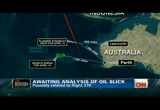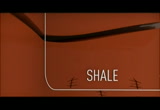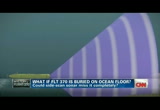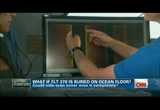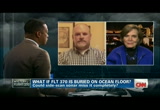tv CNN Special Report CNN April 16, 2014 10:00pm-11:01pm PDT
10:00 pm
d break. doubletree by hilton. where the little things mean everything. wedem . this is cnn breaking news. this is a cnn special report, the mystery of flight 370, i'm don lemon. and we begin with breaking news. we are waiting analyze of the data from today's bluefin-21 search. the what that data shows we will bring it to you. we're also waiting results from samples of an oil slick found in the search zone. tests are under way to tell if it is from flight 370. and the families of flight 370's passeng passengers have had enough. >> you're all bloody liars and you're lying to us again. >> that is just one angry relative lashing out at a
10:01 pm
malaysian official. the families want answers. i'm going to talk to one man who knows how they feel, a man who lost his sister in the crash of flight 447. and we have experts standing by to answer questions like this one, the cell phone being on in the cockpit. is it possible the cell phone was trying to lay bread crumbs by turning his phone on to make sure somebody was aware of the plane's location? i want to turn now to cnn's reporters in the search zone, mike am holmes -- michael holmes is in perth, nic robertson. what is the status on that testing, michael? >> yeah, we're going to say that it has taken a while, hasn't it, since the slick was first spotted. but you have to look at the logistics of this.
10:02 pm
the slick was about 1600 kilometers over a thousand miles out to sea. now what they had to do was move a navy vessel out towards sea. they then helicoptered to that ship. the ship then went back towards the coast until it was close enough to helicopter it back to land. yeah, quite a task. it is here in perth and being examined. we are expecting that analyze really any time now in the next couple of hours. we're hoping to get a feedback on whether that is linked to malaysian flight 370 or whether it is not. >> and michael, you know, bluefin-21 back after completing a full mission. the data is being currently analyzed. but how encouraged are the managers at the sub to complete the mission this time? >> yeah, they are, it was third time a charm. the first two were cut short. but those operating the bluefin-21, they say don't read too much into those first two aborted missions or cut short
10:03 pm
missions. they say what went wrong the first time was it was programmed to not go any deeper than 4,000 meters. so when it hit that it came back up. it is now reprogrammed for the software issue. and unfortunately, the data from those two missions showed nothing of interest. now, as you said we're waiting for the data from this third full mission. and we'll see how it goes. now, they have covered over the course of those three missions about 34 square miles, 70-odd -- 90-odd square kilometers of their search. it is a tiny amount of what they need to search. and as we have said before, to cover the area could take six weeks, could take two months. >> michael holmes in perth, michael, thank you very much. you know, nic robertson, we learned the co-pilot's cell phone was on at the time. and there could have been other cell phones that hit the tower.
10:04 pm
what are you hearing about any developments on this front? >> reporter: well, we've asked those questions here and we're not getting any answers. we're not even getting any confirmation from malaysian officials about the reports that we've heard the confirmation from u.s. officials that the co-pilot's cell phone made a connection to the tower. officials here don't say anything. they don't deny it. they certainly wouldn't come on record and back it up. and they're not at the moment giving any additional details. we know there is a potential that one cell phone had made connection to a cell tower. there was a potential for any of the other phones belonging to the other 238 people on board to have made a connection. but nothing from malaysian officials. and of course, that is very, very difficult for the families not to get answers, don? >> and nic, some of the families released a lot of questions they had for officials. we'll get into a little more detail later on. but what kind of demands are they making of the authorities? >> reporter: yeah, they have got
10:05 pm
26 questions and a lot of them focus on the emergency locater transmission. 12 questions focus on that. they want to know specifics, the frequency, were these devices tested prior to the flight. were there -- you know, how many were on the plane? were the crew trained to use them? were they supposed to deploy, come into effect when they made contact with water? if they sank in the water were they supposed to float to the surface? they have lots and lots of questions. they also want to know about the flight log book and given access to that. they want to know the serial number of the black boxes, they want to know what type of information can come from the black boxes. and they also want information on the pilot. but what we're told by the malaysian officials is they will tell the family whatever they can. but as we saw in beijing yesterday, this teleconference between the malaysian officials in kuala lumpur and the beijing
10:06 pm
officials technically didn't go very well. accusations of a cover-up by the malaysian government. so the families are feeling very frustrated the longer it goes. the more questions they're coming up with. these questions we have to say are very detailed. but they're very specific and they're really trying to focus on what is keeping their hopes alive. their families may still be alive. so they're really trying to focus and drill down on any detail that might shed light on that, don. >> nic robertson, in kuala lumpur. i want to bring in the team of experts, mary schiavo, former inspector general of the department of transportation. now an attorney for victims of transportation accidents. paul ginsberg, forensic analyst, and black box expert. and geoffrey thomas, airline and
10:07 pm
chief of airlines.com. and we are expecting the results of the oil sample sometime soon. what is the status of that? >> yes, don, we are in fact -- the oil came ashore and delivered down to perth yesterday. we understand it is a 24-hour period for analysis. the analysis we understand is a 24-hour period. we hope today, by 1:02 -- 12 midnight that they will learn if it is hydraulic oil or something thrown by a passing ship. but there seems to be a high level of confidence that this was not the usual marine oil. so there seems to be a level of confidence that this might be
10:08 pm
the first piece of debris, if you like, we find from flight 370. >> but i want to get your thoughts on this, geoffrey. underwater recovery expert told us i think essentially they have found the wreckage site. and he has been on this show with us before. you have spoken with him. we all have. why are he and so many other officials so confident about this? >> well, david is probably one of the most respected wreck hunters in the world, along with people like mr. ballard. he found hms sidney off the west australian coast. he is very experienced with the sort of forensic clues that you will get. and he is combining those, the inmarsat satellite pings, the hand shakes. the refined data that was refined several times. they sent the ocean shield out
10:09 pm
to this very spot and guess what? they get very strong pings. for him, for a wreck hunting expert, that is proof positive. he was probably about to say something similar when he stepped back and said we're very confident. there is a very high level of confidence that they are onto the final resting place of flight 370. >> all right, hello, now, to mary schiavo, the pings have likely gone dead. did we get enough information from those to warrant this type of confidence? >> well, actually, ordinarily you would want to have a lot more for a greater extended period of time. but i think the confidence comes from the fact that they had just four hand shakes, and then a partial fifth from the satellites. and that last one, they sent the ocean shield. and they sent their assets right there. and the first day they got the
10:10 pm
ping. i think that was a big confidence builder that let them know they are in the right place, the hand shakes from the satellite directed them in the right direction. so i think that is probably the confidence is that they seem to be in the right place. and their clues so far are panning out. so that is my take on why they were confident about where they are. >> mr. ginsberg, there are questions about the role that the hms nuclear sub is searching in the area. the second ping that was detected saturday april 5th for 13 minutes. that was considered the most promising ping because of its sound quality. paul, what do you know if anything about that? >> well, i know they have been searching in this 17-mile radius area, that we expect the amplitudes will be different because of the currents and so forth. we talked before about the
10:11 pm
salinity and the sound walls on which to bounce the signals. and hopefully we have a shot because if the amplitude is strong we should be close to it. >> you know, jim, we are still awaiting the information from the bluefin's first full mission after some setbacks. does it seem that the bluefin is capable of doing the job now? >> oh, i think there is no question of whether or not it is capable. and the reading, what it is doing, giving itself enough time to analyze it properly and exercise a lot of patients. >> arthur rosenberg, they are searching in an area that has a tremendous amount of ocean trash. i mean, could we see a similar dynamic that we saw in the aerial search? possible leads, possible debris detect detected that turns out to be just trash? i mean, do we need to be cautious? >> we have to delineate what is going on top of the water?
10:12 pm
i don't think that is enough of an asset to cover efficient lly and effectively the area we have to cover. kind of reminds me if we were in an area fielding the team. there are other assets they can use, which is the orion, the towed sonar scanner, which would speed it up and make this more efficient. >> but someone has to pay for these assets, you can see they're scaling back the aerial search. and i'm sure partially it is because there is money involved in it. mary, am i wrong, getting those assets out there it will in occur a lot of expense? >> it will incur a lot of expense that is borne by the countries. we saw it in the twa flight, the ntsb, there were just not
10:13 pm
budgets for that huge of a scale of an effort. and that was about 45 to $50 million. so there was talk they were going to present the bill to twa and its insurers, and the insurers said no thanks, it is not for us to pay. so there is a real question about who pays for this. and right now each nation is bearing their own expense, even though there is a very large policy. >> jeff wise, as you watch all of this do you think the bluefin is up to the challenge and do you agree with arthur rosenberg that we need more assets out there? >> well, it certainly is encouraging on the third day of the mission, that was a good sign, maybe it was just teething pains to start out with. it is theoretically capable. there was talk that maybe this one was a reconditioned model. maybe it was purchased off a used car lot or something and it was not up to snuff.
10:14 pm
this is very encouraging, i think soon we'll hear the results, maybe we'll even get data that indicates the wreckage is there. it would be premature to jump on the bluefin right now and say it is not up to the task. i think we really have to see what comes up hopefully in the next few hours. >> stay with us everybody, if the plane is buried in silt or sand, will the bluefin be able to find it? we'll take a closer look after this. honestly, i'm pouring everything i have into this place. that's why i got a new windows 2 in 1.
10:15 pm
it has exactly what i need for half of what i thought i'd pay. and i don't need to be online for it to work. it runs office, so i can do schedules and budgets and even menu changes. but it's fun, too -- with touch, and tons of great apps for stuff like music, 'cause a good playlist is good for business. i need the boss's signature for this. i'm the boss. ♪ honestly ♪ i wanna see you be brave
10:16 pm
[ female announcer ] most of the time it's easy to know which option is better. other times, not so much. so it's good to know that mazola corn oil has 4 times more cholesterol blocking plant sterols than olive oil. and a recent study found that it can help lower cholesterol 2 times more. take care of those you love and cook deliciously. mazola makes it better.
10:18 pm
breaking news tonight, we're waiting for analysis from the bluefin-21, the data there after the successful mission, we'll bring that to you just as soon as it comes in. the success of this search is largely riding on that bluefin and its sonar. one unmanned sub, searching in the dark miles below the surface. stephanie elam went out on the water to try to answer a question for us. stephanie, if the plane is on the bottom of the ocean in sand
10:19 pm
and silt, how challenging is it for the search? >> reporter: don, you can see we're out on the boat, i want to introduce you. just -- the indian ocean we've there.how rough it is to work can you put it in perspective for us? >> from a sonar perspective it is actually a good environment, it is very deep, you want to get the sonar down very deep. but the complexity of the depth, to get the sonar down deep you have to put it on the auv. it has to have navigation, communications and dive down deep. it is really complex. >> let's go and look at the data that they're likely getting from a side scan sonar. >> so this is an example of a side scan data. the sensor travels through the water, hits the sea floor and then continues to go. based on that you can build up an image of what is on the bottom. we just passed over a pipeline. >> so does this mean, something
10:20 pm
covered in silt, if it is down there does that mean they won't be able to find it with sonar? >> if it is truly buried, then no you won't be able to find it. more than likely if it is truly buried it will be from the impact. and once it hits the sea floor there is not likely to be further burial. >> so with that in mind, don, it could still be covered but there should be clues if they're in the right area. >> stephanie elam, and sylvia earl, with national geographic. you led many expeditions, what kind of information can you expect from this search of the sea floor? >> well, it is a challenging task for sure, with so much to cover and with limited
10:21 pm
capability. the bluefin is a capable system but it just has a lot to cover. and there are not many systems out there that can do this job. >> so tim, your company purchased a bluefin-21, so you know quite a bit about this. what are the advantages and disadvantages of this technology? >> well, one of the primary advantages is the system is not connected to the ship. so if you're in really rough weather, the auv is close to the bottom. it is unaffected by the ship's motion riding over the big waves. so with the towed system, there is a direct connection to the tow fish, so as the ship travels over big waves that motion woud be transferred back to the tow fish, so the quality of the data should be very good. >> good, i hear you're agreeing with him sylvia?
10:22 pm
>> i am, yes, if you're looking from high above you get less resolution than when you're close to the subject. again, there are not many systems that can go as deep as is required to get good resolution. and the autonomous systems are fairly new technology. when they found the titanic, autonomous underwater systems of this sort simply did not exist. so there are not many even now that is part of the problem. if there were 20 of them out there perhaps it would be more realistic to get -- find what they're looking for in a shorter period of time. >> interesting, what about the question we had our stephanie elam look into, tim. can the bluefin detect wreckage if it were buried in silt at the bottom of the ocean? >> well, having done many searches for airplane wreckage, helicopters and such, typically you don't find the wreckage is
10:23 pm
covered with silt. simply because they're so far away from the -- the rough weather, like if it crashes into a shallow area there is a lot of high current. then you would see some -- possibly some silt covering debris. but when you get a wreck that is that deep you're not going to see any silt. and the sonar would be a very effective tool for finding it. >> you know, the navy tells cnn the bluefin can be programmed to be as far as 5,000 meters. is that pushing the limit? what are the risks of pushing the depth limit? >> well, they test these pressure housings, the vehicles to a specific depth rating. and you know, when you go past that depth rating you're going into what they call a safety factor. and that really is there to protect the technology, if they go too deep the -- one area
10:24 pm
would implode, and you lose the tool that you're trying to search for, search the debris. so you know, if at all possible you don't go past that depth rating. you just want to keep the equipment safe to continue to search. >> uh-huh. and so then it is lost forever then and that defeats the purpose. sylvia. what about a manned underwater vehicle? most of the passengers on board say -- most of them were chinese, why isn't the sea dragon out there, is the question? >> well, once the target is found, deploying manned systems and remotely operated tethered vehicles to operate equipment makes sense. but to deploy the sea dragon or any of the other vehicles that
10:25 pm
exist, and they are not vm that can go as much as two and a half to three miles, deep manned and deep obje-- robotic systems, bu once you found what you're looking for they really have a very limited area and move much more slowly than the bluefin. the bluefins seem relatively slow compared to an aircraft or ship on the surface, but much faster than sending a manned system down where you really don't know what you're looking for, and they would have sonar. but you see the bluefin, and there are several other pieces of equipment that are designed to do this survey. and imaging with sound. but, having -- and there is a place, i love the place, where manned systems and the robot. but first you have to find the system. >> coming up well after a month, it is very likely that the black
10:26 pm
boxes are dead and we've heard our last ping. so do searchers need a plan b? we'll be right back with a look at this next. ameriprise asked people a simple question: can you keep your lifestyle in retirement? i don't want to think about the alternative. i don't even know how to answer that. i mean, no one knows how long their money is going to last. i try not to worry, but you worry. what happens when your paychecks stop? because everyone has retirement questions. ameriprise created the exclusive confident retirement approach. to get the real answers you need. start building your confident retirement today.
10:27 pm
marge: you know, there's a more enjoyable way to get your fiber. try phillips fiber good gummies. they're delicious, and an excellent source of fiber to help support regularity. wife: mmmm husband: these are good! marge: the tasty side of fiber. from phillips. i'm spending too much time hiring and not enough time in my kitchen. [ female announcer ] need to hire fast? go to ziprecruiter.com and post your job to over 30 of the web's leading job boards with a single click; then simply select the best candidates from one easy to review list. you put up one post and the next day you have all these candidates. makes my job a lot easier.
10:28 pm
[ female announcer ] over 100,000 businesses have already used zip recruiter and now you can use zip recruiter for free at a special site for tv viewers; go to ziprecruiter.com/offer5. at a special site for tv viewers; [boy] mom!ughs] [mom] yes? [boy] whoa,whoa,whoa... [mom and dad] [laughing] [boy] whoa,whoa,whoa... [mom] you've got two left feet,boo.
10:29 pm
10:30 pm
cnn's jean casarez has more. >> reporter: the sea has gone silent, more than a week after the last ping was heard, black box batteries are likely dead. with no evidence in hand, searchers for flight 370 are considering their next moves. >> we may not have all the clues. and we may have overlooked something. >> reporter: australian officials say they will scale back the air search soon. >> the chances of any floating material being recovered have greatly diminished. >> reporter: but under sea recovery efforts may expand if necessary, experts say, extending parts of the search area. >> i think that will involve retracing that initial arc of the suspected flight path. and that will require some very broad sonar tools. >> reporter: sonar, even more powerful than the bluefin-21, that can dive deeper and create even wider images of the ocean's bottom. it is still the best tool searchers have at their
10:31 pm
disposal. >> until we actually locate some debris with sonar there is no point in bringing in remote operated vehicles or manned submersibles. so sonar is going to be the tool of choice for the foreseeable future. >> reporter: it could be weeks, months, or even years before debris turns up. >> my experience is that something is always seen, whether it is debris from a passing ship, or something stranded there is always a clue there is something along the way. >> reporter: the only option not on the table, he says, is to stop looking altogether. >> the entire aviation industry is underpinned by this drive for safety. and so until we know what happened to mh-370, we wouldn't know that we can avoid this kind of tragedy in the future. >> that was jean casarez reporting, thank you, jean. i'm back with my panel of
10:32 pm
experts. to geoffrey, they would need to rethink their entire approach if they exhaust their efforts and the bluefin fails to locate anything underwater. what are they saying would happen next? >> well, look, i'm more guided by air chief marshal angus houston, who caused us last week that this would be a long search. it will take us two months, approximately, to actually search the area of interest. so i think three days into the underwater search, i think we should be guided by angus houston, very measured man. very cautious man. he has done this before. and we're on mission number three for bluefin-21. i think we have a little way to go before we start to look at plan b. >> uh-huh, he has been very calm
10:33 pm
and direct and doesn't over-hype anything. paul, is the reality that sonar is pretty much the only useful tool at this stage in this investigation? >> well, i think so. it is also the safest. and as some of the panel has already said, why risk someone getting into trouble before we know where we're going? and mind you, we're looking for a nickel somewhere on the yankees stadium playing field in the dark. so we have got to find that first. >> arthur, investigators are beginning to look into signs that the cell phone was turned on in the cockpit. and we have a tweet. saying is it possible he was trying to lay bread crumbs by turning his phone on to make someone aware of the plane's location? >> yeah, well, the issue with bread crumbs is, some of them lead to the cheese and others don't. in this case, i'm of the mind that the cell phone hand shake with the cell phone tower when
10:34 pm
they overflew panang, beginning with the acars location, we turn around and fly across the malay peninsula. also importantly, the captain finally we know is communicating, which means the co-pilot is flying. now we have a co-pilot's cell phone hand shake with the cell phone tower. a cell phone that should have been off. when you look at it in that context i think it leads you to at least consider that the co-pilot or someone with his cell phone was reaching out. but of course, there are a lot of unanswered questions, 238 other people on board. someone else's cell phone surely made the cell phone contact, but
10:35 pm
i think it is very significant. >> jim tilmon, there were 12 aircraft involved in the search today despite the officials saying they're planning to scale back the aerial search very soon. doesn't seem like they were winding down the search, does it? >> no, they seem to keep talking about it and are going out yet another day. i think they have something else in mind, maybe something we don't know about. >> could be very true. and jeff wise, one possibility is that civilian contractors could take a larger role. if that happens would that change the search, do you think? >> well, i mean, as long as the resources continue to be committed, the search will continue. it really boils down to what information the authorities have. how confident they are that this investment of resources and material will yield results. and i think a lot of that will depend on what we find.
10:36 pm
as the prime minister said i think the next week will be kris crucial. there is a fairly limited area on the sea bed that corresponds to those pings. i think what the prime minister said is probably accurate. we'll know next week if the pinpink -- pings were accurate. >> how long will they have to go before they stop and weigh the cost of the search like this? >> oh, absolutely, they will have to do that. and i think they will stop the above the water search very soon. they will have to do that, one is because they have the ships and people and manpower out there. they're going to get tired, in addition to getting expensive. and they're going to have to direct their resources to places where they're really going to
10:37 pm
matter. and then they will have to broach the subject with the airlines and the insurer and the recovery they're willing to pay for. there are cases where there are suits filed over that. >> wow, all right, when we come back my team of experts will answer your questions. ♪ ...work with equity experts... ♪ ...who work with regional experts... ♪ ...who work with portfolio management experts, that's when expertise happens. mfs. because there is no expertise without collaboration. mfs. to truck guys, the truck is everything. and when you put them in charge of making an unbeatable truck... ... good things happen. this is the ram 1500. the 2014 motor trend
10:38 pm
10:41 pm
search area for flight 370. it has searched approximately 90 square kilometers. and the data from its latest mission is being analyzed. the oil sample from the ocean shield is being analyzed, as well. we'll bring you the results as soon as we learn them. and back with my panel, jeff wise, we have a question from susan who says why not take a plane and research the flight path, maybe they would spot something. you know, you re-trace your own steps when you lose something. jeff, is that kind of common sense, reviewing the data that we have? >> well, that is a great idea. there is just one missing piece of data. and that is how fast was the plane flying. you see what we have are the arcs, the northern and southern arcs, that is the range of
10:42 pm
possible locations where it ended up at 8 a.m. that morning. so how it got to that range of final positions is the big unknown. and the faster it went the more southerly that route would have taken it. if you will recall when the surface search started weeks it was way to the south and gradually they moved it further north. testing out the possible speeds. so it is a great idea. unfortunately we just don't know what that route was. >> okay, mary schiavo, is the search team getting advice from experts who helped from previous rescue experts. fill us in on how it relates to previous searches. >> yes, actually, we know for a fact that ntsb, boeing, they consulted the french authorities with the bea. the malaysian -- actually went to the u.k. and talked to the
10:43 pm
people in the u.k., including icao. so i guess the ones they haven't talked to is transport canada. but those are the major ones who have investigations on accident reconstruction, analyzing black box data. so they all seem to be involved. so there is coordination. >> okay, arthur, i want to present this question to you. it says why doesn't the press press authorities to get access to secret information. how do they play a role in access for the families? >> well, i think the press is doing an absolutely spectacular job, digging, trying to ferret out all the information. but the press has very limited ability to get the malaysian authorities to release information. if this were in the united states, for example, the ntsb would have already released the preliminary statement. the press would be involved. we would have basic factual information about this airplane, generally being if it was
10:44 pm
discoverable before the crash you can get it after the crash. but our hands are kind of tied given that we're dealing with malaysia. and the concept of the free press in malaysia is really very different from what it is in the united states. >> well, malaysia doesn't really have a free and open press. and that is why the family members are happy that we're there to press authorities to get more answers. jim, here is a question that needs an answer about the boeing 777. the triple 7. it is one of the most reliable airplanes built with computer-mediated controls. what if this technology has failed? do you believe it can stem from a problem with this airplane, or is it something else entirely? >> obviously, i don't know exactly what happened. but i have to tell you i would be shocked to find that there was anything wrong with that airplane. i mean, the -- the boeing people know how to build an airplane. and this one, i think, has served extremely well over the past decade.
10:45 pm
i can't imagine how all of a sudden something would be so catastrophic and so completely devastating to the conduct of that flight that the airplane was at fault. i think that is the last place i want to look. >> all right, geoffrey thomas, you know this was is from tammy. why isn't the chinese using their unmanned search vehicle rather than the u.s.? should we expect more involvement here from the chinese? >> look, we do have a lot of involvement from the chinese. but the malaysians are running this search under the icao rules. and they have asked australia to lead the search in the southern sector. which we're doing. but of course we're doing it with the help of the chinese, with the help of the united states and the british. i mean, we're getting our very, very best minds and expertise we possibly can. this is really an international of the. and certainly the chinese here, the chinese ships are here. there are about six of them.
10:46 pm
and their aircraft. and i think if necessary we will bring down the chinese submersible if it is required. but i still think that the best course of action is with bluefin-21 for the time being. because that is a proven platform. it found air france 447. and i really do believe that they are taking the right course of action at this stage. >> all right, geoffrey thomas, thank you, everyone else stay with me. we'll be right back. it has exactly what i need for half of what i thought i'd pay. and i don't need to be online for it to work. it runs office, so i can do schedules and budgets and even menu changes. but it's fun, too -- with touch, and tons of great apps for stuff like music, 'cause a good playlist is good for business. i need the boss's signature for this. i'm the boss. ♪ honestly ♪ i wanna see you be brave
10:48 pm
10:49 pm
to over 30 of the web's leading job boards with a single click; then simply select the best candidates from one easy to review list. you put up one post and the next day you have all these candidates. makes my job a lot easier. [ female announcer ] over 100,000 businesses have already used zip recruiter and now you can use zip recruiter for free at a special site for tv viewers; go to ziprecruiter.com/offer5.
10:50 pm
welcome back, everyone, breaking news here on cnn, some of the families of the passengers on flight 370 released a list of 26 questions they want malaysian officials to answer. this, as frustrations boiled over in beijing as families accuse those officials of being bloody liars. i want to bring in my team of experts now to talk about this. you know, mary today, some of the families released a list of questions that they sent to malaysian authorities, including requesting the log book, air traffic control, and personal information from inmarsat. why do the authorities want those specifics, do you think? >> well, because that is what families after accidents do, they pore over everything and become experts. say they want to pull up the asiana accident, they could go on the ntsb website and they
10:51 pm
would find this kind of detail released in the public docket. so they have examples to go by. when they see the rest of the world treated one way and their accident getting treated another, they feel there is something wrong and they're not getting this information. every crash is like this. the families want every detail, every piece of information. and they become powerful allies. and if there is change for safety, they're the ones that can do it. they're actually the ones that can do it. >> arthur, you know, many of these questions about the black boxes, the families want to know the details, as much as they possibly can as mary said. and how will this information help them? >> well, i think these families are trying to make sense of seeming insanity. like the elts, for example, it is very perplexing. there were no elts signals that
10:52 pm
we know of. there is an elt in front of the plane, sensing the acceleration, in the rear of the plane it is triggered by salt water. all the life preservers have elts, and yet there is none. i think these people are grasping at any information they can get their hands on. and my hat is off to them. i think what the malaysian authorities failed to do early on is establish credibility with these families. and they continue to linger and are part of the impetus that these families are looking for. >> jeff, the areas previously searched were searched thoroughly and don't need to be investigated again. that is a pretty good question? i mean, they're just making sure. >> well, absolutely, it has been such an emotional roller coaster for me personally, a lot of us covering this story. you imagine if you additionally have a loved one whose fate you
10:53 pm
really don't know the answer to. and you know, it is so perplexing. huge areas of the ocean have been searched. but it is not like land where if something comes to rest it will stay there. you know, you could search an area and there is nothing there. but then the current could bring something there. something could rise up from below. it is a moving target. you know, if you're really looking for closure it is so frustrating, i'm sure. >> yeah, absolutely, jim, you were you surprised by the technical nature of many of the questions these families had for authorities? >> not a bit. i have to tell you, i have great respect for these families and for their decorum. and the fact that they have held up as well as they have. and i have a great deal of confidence that they're thinking through this entire affair. they have done tremendous research on their own. as mary has said, they're going to become experts before this thing is over. >> paul, should these families expect to receive an answer on
10:54 pm
some of these technical questions? the pieces of information. are they best kept secret at this stage of the investigation, do you think? >> well, as mary has said, previously, usually the air to ground transmission recordings are not generally released during an investigation. they do come out from other third parties who monitor the frequencies and release them. but things like the elt frequency, that is well known. it is universal, it is public information. and i don't know what they're going to do with it. but certainly, that is easy to answer. >> all right, thank you very much. stand by, everyone, when we come right back one more question. and it is a big one, what has all of this revealed about the limits of our technology? that is next. ♪
10:55 pm
[ female announcer ] most of the time it's easy to know which option is better. other times, not so much. so it's good to know that mazola corn oil has 4 times more cholesterol blocking plant sterols than olive oil. and a recent study found that it can help lower cholesterol 2 times more. take care of those you love and cook deliciously. mazola makes it better. take care of those you love and cook deliciously. i'm glad i'm with you. this weekend away, was long over-due.
10:56 pm
10:58 pm
we have time for an answer to one more question and paul i'm going to start with you. carlos says how come nasa can see lakes under surface of moons remotely but we can't find a plane here. using the right technology what does it reveal about the limits of our technology. >> in fact, yes, there are limited. we have different amounts of resolution at different depths. we have changing situations
10:59 pm
where on most moons i believe they're dry and nothing is changing. and we're obscured by a number of miles offal water. >> yeah. >> mary we have got to a point we think we are invincible and can solve everything and see everything and this is revealing maybe not so much. >> maybe not so much. but i think that regular people like the families can't understand why -- and they use the analogy that their cell phone has more tracking technology than this plane possibly at the bottom of the ocean. we all demanded that technology. now we have to demand that technology in our airplanes. >> you're quite right. >> jeff wise. have we reached the limit of our technology? >> can't forget the people who did this can't want to be found. they eluded our technology. >> if someone did in fact want to do it. thank you i appreciate you.
11:00 pm
i'm don lemon. that's it for us tonight. that's it for us tonight. "ac360" starts right now. -- captions by vitac -- www.vitac.com >> it's 2:00 oa.m. on the east coast of the united states. new clinch glitches with the bluefin-21. new questions about why there is only one in the quarter and new questions about cell phone signals from the aircraft itself. is it remotely conceivable that the co-pilot's phone was the only one transmitting and do they have a plan "b" if the search comes up empty. a lot of questions tonight. a crucial 24 hours ahead. we have all the angles on that. the passengers on a sinking south korean ferry were told stay put, don't head for the lifeboats. hundreds are missing, many of them high school students. some of whom sent messages home as the ship went under. the race
89 Views
Uploaded by TV Archive on

 Live Music Archive
Live Music Archive Librivox Free Audio
Librivox Free Audio Metropolitan Museum
Metropolitan Museum Cleveland Museum of Art
Cleveland Museum of Art Internet Arcade
Internet Arcade Console Living Room
Console Living Room Books to Borrow
Books to Borrow Open Library
Open Library TV News
TV News Understanding 9/11
Understanding 9/11








